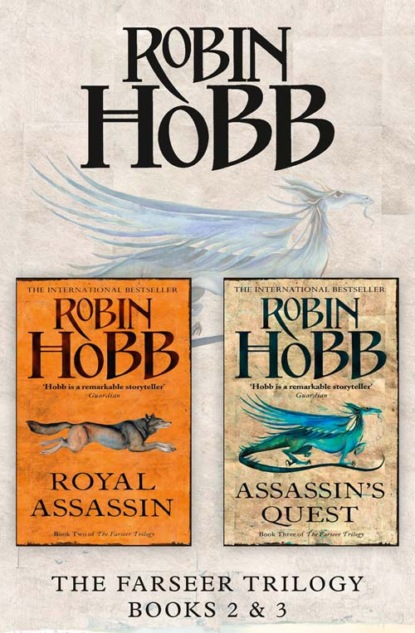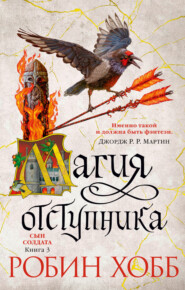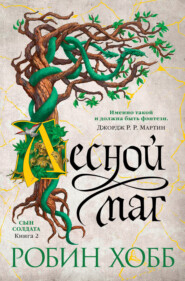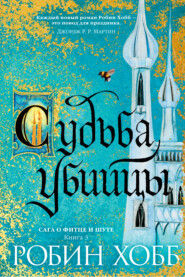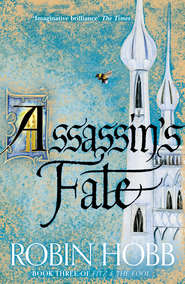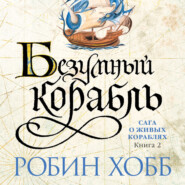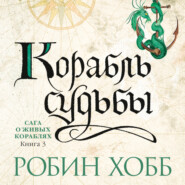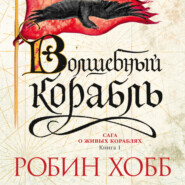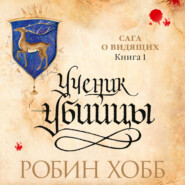По всем вопросам обращайтесь на: info@litportal.ru
(©) 2003-2025.
✖
The Farseer Series Books 2 and 3: Royal Assassin, Assassin’s Quest
Автор
Год написания книги
2018
Настройки чтения
Размер шрифта
Высота строк
Поля
‘This walks close to disloyalty,’ I said just as simply. ‘Soldiers of Verity’s own guard, setting aside his colours to take on his queen’s …’
‘Some might see it that way. Some might speak it that way.’ Her eyes met mine squarely, and the smile was gone from her face. ‘But you know it is not. It’s a needed thing. Your … Chivalry would have seen it, would have had a guard for her before she even arrived here. But King-in-Waiting Verity … well, this is no disloyalty to him. We’ve served him well, because we love him. Still do. This is those who’ve always watched his back, falling back and reforming to watch his back even better. That’s all. He’s got a good queen, is what we think. We don’t want to see him lose her. That was all. We don’t think any the less of our King-in-Waiting. You know that.’
I did. But still. I looked away from her plea, shook my head and tried to think. Why me? a part of me demanded angrily. Then I knew, that in the moment I’d lost my temper and berated the guard for not protecting their queen, I’d volunteered for this. Burrich had warned me about not remembering my place. ‘I will speak to King-in-Waiting Verity. And to the Queen, if he approves this.’
Whistle flashed her smile again. ‘We knew you’d do it for us. Thanks, Fitz.’
As quickly she was spinning away from me, stave at the ready as she danced threateningly toward her partner, who gave ground grudgingly. With a sigh, I turned away from the courtyard. I had thought Molly would be fetching water at this time. I’d hoped for a glimpse of her. But she was not, and I left feeling disappointed. I knew I should not play at such games, but some days I could not resist the temptation. I left the courtyard.
The last few days had become a special sort of self-torture for me. I refused to allow myself to see Molly again, but could not resist shadowing her. So I was in the kitchen but a moment after she had left, fancying I could still catch the trace of her perfume in the air. Or I stationed myself in the Great Hall of an evening, and tried to be where I could watch her without being noticed. No matter what amusement was offered, minstrel or poet or puppeteer, or just folk talking and working on their handicrafts, my eyes would be drawn always to wherever Molly might be. She looked so sober and demure in her dark blue skirts and blouse, and she had never a glance for me. Always she spoke with the other keep women, or on the rare evenings when Patience chose to descend, she sat beside her and attended to her with a focus of attention that denied I even existed. Sometimes I thought my brief encounter with her had been a dream. But at night I could go back to my room, and take out the shirt I had hidden in the bottom of my clothes chest, and if I held it close to my face, I fancied I could still smell the faint trace of her perfume upon it. And so I endured.
A number of days had passed since we had burned the Forged ones on their funeral pyre. In addition to the formation of the Queen’s Guard, other changes were afoot within and without the keep. Two other master boat-builders, unsummoned, had come to volunteer their skills for the building of the ships. Verity had been delighted. But even more so had Queen Kettricken been moved, for it was to her that they presented themselves, saying that they desired to be of service. Their apprentices came with them, to swell the ranks of those working in the shipyards. Now the lamps burned both before dawn and after the sun’s setting, and work proceeded at a breakneck pace. So Verity was away all the more, and Kettricken, when I called on her, was more subdued than ever. I tempted her with books or outings to no avail. She spent most of her time sitting near idle at her loom, growing more pale and listless with every passing day. Her dark mood infected those ladies who attended her, so that to visit her room was as cheery as keeping a death watch.
I had not expected to find Verity in his study, and was not disappointed. He was down at the boat-sheds, as always. I left word with Charim to ask that I be summoned whenever Verity might have the time to see me. Then, with a resolve to keep myself busy and to do as Chade suggested, I returned to my room. I took both dice and tally sticks with me, and headed for the Queen’s chambers.
I had resolved to teach her some of the games of chance that the lords and ladies were fond of, in the hopes that she might expand her circle of entertainments. I also hoped, with less expectation, that such games might draw her to socialize more widely and to depend less on my companionship. Her bleak mood was beginning to burden me with its oppressiveness, so that I often heartily wished to be away from her.
‘Teach her to cheat first. Only, just tell her that’s how the game is played. Tell her the rules permit deception. A bit of sleight of hand, easily taught, and she could clean Regal’s pockets for him a time or two before he dared suspect her. And then what could he do? Accuse Buckkeep’s lady of cheating at dice?’
The Fool, of course. At my elbow, companionably pacing alongside me, his rat sceptre jouncing lightly on his shoulder. I did not startle physically, but he knew that, once more, he had taken me by surprise. His amusement shone in his eyes.
‘I think our Queen-in-Waiting might take it amiss if I so misinformed her. Why do you not come with me instead, to brighten her spirits a bit? I shall set aside the dice, and you can juggle for her,’ I suggested.
‘Juggle for her? Why, Fitz, that is all I do, all day long, and you see it as but my foolery. You see my work and deem it play, while I see you work so earnestly at playing games you have not yourself devised. Take a Fool’s advice on this. Teach the lady not dice, but riddles, and you will both be the wiser.’
‘Riddles? That’s a Bingtown game, is it not?’
‘’Twere one played well at Buckkeep these days. Answer me this one, if you can. How does one call a thing when one does not know how to call it?’
‘I have never been any good at this game, Fool.’
‘Nor any other of your blood-line, from what I have heard. So answer this. What has wings in Shrewd’s scroll, a tongue of flame in Verity’s book, silver eyes in the Relltown Vellums, and gold-scaled skin in your room?’
‘That’s a riddle?’
He looked at me pityingly. ‘No. A riddle is what I just asked you. That’s an Elderling. And the first riddle was, how do you summon one?’
My stride slowed. I looked at him more directly, but his eyes were always difficult to meet. ‘A riddle, or a serious question?’
‘Is that a riddle? Or a serious question?’
‘Yes.’ The Fool was grave.
I stopped in mid-stride, completely bemuddled. I glared at him. In answer, he went nose to nose with his rat sceptre. They simpered at one another. ‘You see, Ratsy, he knows no more than his uncle or his grandfather. None of them knows how to summon an Elderling.’
‘By the Skill,’ I said impetuously.
The Fool looked at me strangely. ‘You know this?’
‘I suspect it is so.’
‘Why?’
‘I don’t know. Now that I consider it, I do not think it likely. King Wisdom made a long journey to find the Elderlings. If he could simply have Skilled to them, why didn’t he?’
‘Indeed. But sometimes there is truth in impetuosity. So riddle me this, boy. A king is alive. Likewise a prince. And both are Skilled. But where are those who trained alongside the King, or those who trained before him? How come we to this, this paucity of Skilled ones at a time when they are so grievously needed?’
‘Few are trained in times of peace. Galen didn’t see fit to train any, up until his last year. And the coterie he created …’ I paused suddenly, and though the corridor was empty, I suddenly did not want to speak any more about it. I had always kept whatever Verity told me about the Skill in confidence.
The Fool pranced in a sudden circle about me. ‘If the shoe does not fit, one cannot wear it, no matter who made it for you,’ he declared.
I nodded grudgingly. ‘Exactly.’
‘And he who made it is gone. Sad. So sad. Sadder than hot meat on the table and red wine in your glass. But he who is gone was made by someone in turn.’
‘Solicity. But she is also gone.’
‘Ah. But Shrewd is not. Nor Verity. It seems to me, that if there are two she created still breathing, there ought to be others. Where are they?’
I shrugged. ‘Gone. Old. Dead. I don’t know.’ I forced my impatience down, tried to consider his question. ‘King Shrewd’s sister, Merry. August’s mother. She would have been trained, perhaps, but she is long dead. Shrewd’s father, King Bounty was the last to have a coterie, I believe. But very few folk of that generation are still alive.’ I halted my tongue. Verity had once told me that Solicity had trained as many in the Skill as she could find the talent in. Surely there must be some of them left alive; they would be no more than a decade or so older than Verity …
‘Dead, too many of them, if you ask me. I do know.’ The Fool interjected an answer to my unspoken question. I looked at him blankly. He stuck his tongue out at me, waltzed away from me a bit. He considered his sceptre, chucked the rat lovingly under the chin. ‘You see, Ratsy, it is as I told you. None of them know. None of them are smart enough to ask.’
‘Fool, cannot you ever speak plain?’ I cried out in frustration.
He halted as suddenly as if struck. In mid-pirouette, he lowered his heels to the floor and stood like a statue. ‘Would it help at all?’ he asked soberly. ‘Would you listen to me if I came to you and did not speak in riddles? Would that make you pause and think and hang upon every word, and ponder those words later, in your chamber? Very well then. I shall try. Do you know the rhyme, Six Wisemen went to Jhaampe-town?’
I nodded, as confused as ever.
‘Recite it for me.’
‘Six Wisemen went to Jhaampe-town, climbed a hill and never came down, turned to stone and flew away…’ The old nursery rhyme eluded me suddenly. ‘I don’t recall it at all. It’s nonsense anyway, one of those rhyming things that sticks in your head but means nothing.’
‘That, of course, is why it is enscrolled with the knowledge verses,’ the Fool concluded.
‘I don’t know!’ I retorted. I suddenly felt irritated beyond endurance. ‘Fool, you are doing it again. All you speak is riddles, ever! You claim to speak plain, but your truth eludes me.’
‘Riddles, dear Fitzy-fitz, are supposed to make folk think. To find new truth in old saws. But, be that as it may … Your brain eludes me. How shall I reach it? Perhaps if I came to you, by dark of night, and sang under your window:
Bastard princeling, Fitz my sweet,
You waste your hours to your own defeat.
You work to stop, you strive to refrain,
When all your effort should go to a gain.’
He had flung himself to one knee, and plucked nonexistent strings on his sceptre. He sang quite lustily, and even well. The tune belonged to a popular love ballad. He looked at me, sighed theatrically, wet his lips and continued mournfully,





